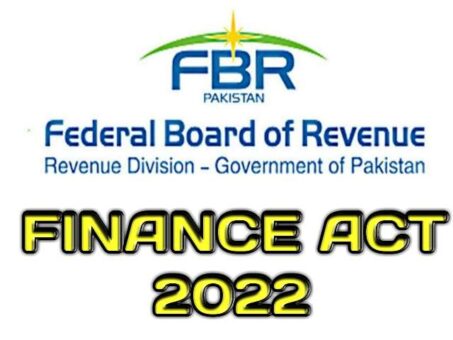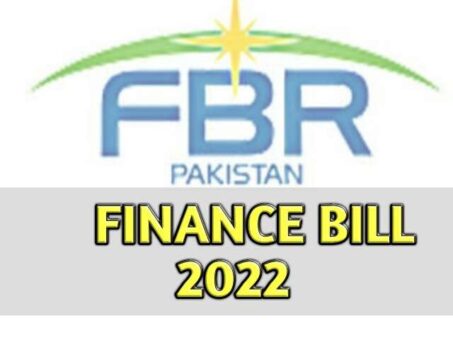KARACHI: Federal Board of Revenue (FBR) has issued salary income tax rates for filing return tax year 2023.
(more…)Tag: salary income
-

FTO directs fair treatment of salary taxation for temporary employees
Federal Tax Ombudsman (FTO) has issued instructions regarding salary taxation for temporary / adhoc employees and directed employers and tax authorities to deduct tax of such employees under Section 149 of Income Tax Ordinance, 2001.
(more…) -

Finance Act 2022 revises tax rates for salaried persons
KARACHI: The federal government has withdrawn the proposal to give concessions to salaried persons and retained the minimum threshold for salary income at Rs600,000.
Through the Finance Act, 2022 the new tax rates on salary income have been implemented from July 01, 2022.
The new tax rates are as follow:
READ MORE: Proposal of final tax regime for commercial importers rejected
01. Where the taxable income does not exceed Rs 600,000: the tax rate shall be zero.
02. Where the taxable income exceeds Rs 600,000 but does not exceed Rs 1,200,000: the tax rate shall be 2.5 per cent of the amount exceeding Rs 600,000.
03. Where the taxable income exceeds Rs 1,200,000 but does not exceed Rs2,400,000: the tax amount shall be Rs 15,000 + 12.5 per cent of the amount exceeding Rs 1,200,000.
04. Where the taxable income exceeds Rs2,400,000 but does not exceed Rs 3,600,000: the tax amount shall be Rs 165,000 + 20 per cent of the amount exceeding Rs 2,400,000.
READ MORE: Mechanism revamped for tax dispute resolution
05. Where the taxable income exceeds Rs 3,600,000 but does not exceed Rs 6,000,000: the tax amount shall be Rs 405,000 + 25 per cent of the amount exceeding Rs 3,600,000.
06. Where the taxable income exceeds Rs 6,000,000 but does not exceed Rs 12,000,000: the tax amount shall be Rs 1,005,000 + 32.5 per cent of the amount exceeding Rs 6,000,000.
07. Where the taxable income exceeds Rs 12,000,000: the tax amount shall be Rs 2,955,000 + 35 per cent of the amount exceeding Rs 12,000,000.
Earlier, through Finance Bill, 2022 following rates of tax proposed for salaried person:
READ MORE: Simplified tax regime for shopkeepers implemented
01. Where taxable income does not exceed Rs. 600,000: the tax rate was zero.
02. Where taxable income exceeds Rs. 600,000 but does not exceed Rs. 1,200,000: the tax rate was Rs100
03. Where taxable income exceeds Rs. 1,200,000 but does not exceed Rs. 2,400,000: the tax rate was 7 per cent of the amount exceeding Rs. 1,200,000.
04. Where taxable income exceeds Rs. 2,400,000 but does not exceed Rs. 3,600,000: the tax amount was Rs. 84,000 + 12.5 per cent of the amount exceeding Rs. 2,400,000.
05. Where taxable income exceeds Rs. 3,600,000 but does not exceed Rs. 6,000,000: the tax amount was Rs. 234,000 + 17.5 per cent of the amount exceeding Rs. 3,600,000.
READ MORE: Pakistan withdraws tax amnesties for industrial promotion
06. Where taxable income exceeds Rs. 6,000,000 but does not exceed Rs. 12,000,000: the tax amount was Rs. 654,000 + 22.5 per cent of the amount exceeding Rs. 6,000,000.
07. Where taxable income exceeds Rs. 12,000,000: the tax amount was Rs. 2,004,000 + 32.5 per cent of the amount exceeding Rs. 12,000,000.
-

Pakistan announces massive tax reduction for salaried persons
KARACHI: Pakistan has announced massive tax reduction for salaried persons in the budget 2022/2023. The country announced federal budget 2022/2023 on June 10, 2022 and announced massive reduction in tax on the income of salaried person, which may be applicable from July 01, 2022.
Through Finance Bill, 2022 the tax slabs have been reduced to seven from 12. Besides, bringing down the number of slabs, the country also provided massive tax relief in payment of tax.
READ MORE: Pakistan reduces salary tax slabs to 7 in budget 2022/23
According to PwC A F Ferguson & Co. the persons falling in various tax slabs will save tax amount in tax year 2022-2023.
Following is the comparison in proposed salary taxes and existing taxes calculated by PwC A F Ferguson&Co.
READ MORE: Massive cut in subsidies to curtail current expenditures
Amount in Rupees
Annual taxable income Existing tax Proposed tax (Saving) / Excess tax 600,000 – – Nil 1,200,000 30,000 100 (29,900) 2,400,000 180,000 84,000 (96,000) 3,600,000 390,000 234,000 (156,000) 6,000,000 895,000 654,000 (241,000) 12,000,000 2,345,000 2,004,000 (341,000) 18,000,000 4,845,000 3,954,000 (891,000) 24,000,000 5,645,000 5,904,000 259,000 The finance bill proposed following income slabs and rate of tax for salaried persons for tax year 2022/2023:
READ MORE: Petroleum levy to generate Rs750 billion
S# Taxable Income Rate of Tax (1) (2) (3) 1. Where taxable income does not exceed Rs. 600,000 0 2. Where taxable income exceeds Rs. 600,000 but does not exceed Rs. 1,200,000 Rs. 100 3. Where taxable income exceeds Rs. 1,200,000 but does not exceed Rs. 2,400,000 7% of the amount exceeding Rs. 1,200,000 4. Where taxable income exceeds Rs. 2,400,000 but does not exceed Rs. 3,600,000 Rs. 84,000 + 12.5% of the amount exceeding Rs. 2,400,000 5. Where taxable income exceeds Rs. 3,600,000 but does not exceed Rs. 6,000,000 Rs. 234,000 + 17.5% of the amount exceeding Rs. 3,600,000 6. Where taxable income exceeds Rs. 6,000,000 but does not exceed Rs. 12,000,000 Rs. 654,000 + 22.5% of the amount exceeding Rs. 6,000,000 7. Where taxable income exceeds Rs. 12,000,000 Rs. 2,004,000 + 32.5% of the amount exceeding Rs. 12,000,000.” The existing income slabs and rate of tax for salaried persons:
READ MORE: FBR assigned tax collection target of Rs7 trillion in 2022/2023
1. Where taxable income does not exceed: Rs. 600,000 0%
2. Where taxable income exceeds Rs. 600,000 but does not exceed Rs. 1,200,000: 5% of the amount exceeding Rs. 600,000
3. Where taxable income exceeds Rs. 1,200,000 but does not exceed Rs. 1,800,000: Rs. 30,000 plus 10% of the amount exceeding Rs. 1,200,000
4. Where taxable income exceeds Rs. 1,800,000 but does not exceed Rs. 2,500,000: Rs. 90,000 plus 15% of the amount exceeding Rs. 1,800,000
5. Where taxable income exceeds Rs.2,500,000 but does not exceed Rs. 3,500,000: Rs. 195,000 plus 17.5% of the amount exceeding Rs. 2,500,000
6. Where taxable income exceeds Rs. 3,500,000 but does not exceed Rs. 5,000,000: Rs. 370,000 plus 20% of the amount exceeding Rs. 3,500,000
7. Where taxable income exceeds Rs. 5,000,000 but does not exceeds Rs. 8,000,000: Rs. 670,000 plus 22.5% of the amount exceeding Rs. 5,000,000
8. Where taxable income exceeds Rs. 8,000,000 but does not exceeds Rs. 12,000,000: Rs. 1,345,000 plus 25% of the amount exceeding Rs. 8,000,000
9. Where taxable income exceeds Rs. 12,000,000 but does not exceeds Rs. 30,000,000: Rs. 2,345,000 plus 27.5% of the amount exceeding Rs. 12,000,000
10. Where taxable income exceeds Rs. 30,000,000 but does not exceeds Rs. 50,000,000: Rs. 7,295,000 plus 30% of the amount exceeding Rs. 30,000,000
11. Where taxable income exceeds Rs. 50,000,000 but does not exceeds Rs. 75,000,000: Rs. 13,295,000 plus 32.5% of the amount exceeding Rs. 50,000,000
12. Where taxable income exceeds Rs. 75,000,000 Rs. 21,420,000 plus 35% of the amount exceeding Rs. 75,000,000]
-

Salaried persons denied adjustments against deduction
ISLAMABAD: Salaried persons have been denied adjustment of tax credits against the deduction at source. The amendment has been introduced through Finance Bill, 2022.
The government on June 10, 2022 presented federal budget 2022/2023 and announced various taxation measures.
The Finance Bill, 2022 proposed amendment to sub-section 1 of Section 149 of Income Tax Ordinance, 2001.
READ MORE: New ADR mechanism introduced to facilitate taxpayers
Under the present laws, employers are required to deduct / withholding tax at the time of payment to their employees. The employers are also authorized to adjust withholding tax paid by employees against other source of income.
However, through the proposed amendment employers would not be allowed to adjust deduction under Section 62, 63 and 64.
Finance Bill also recommended changes in Alternate Dispute Resolution (ADR).
Through the Finance Bill, 2022 amendment to Section 134A of Income Tax Ordinance, 2001 has been suggested.
READ MORE: FBR to disable mobile SIMs on non-filing of tax returns
The text of proposed amended Section 134A is as follow:
“134A. Alternative Dispute Resolution. — (1) Notwithstanding any other provision of the Ordinance, or the rules made thereunder, an aggrieved person in connection with any dispute pertaining to—
READ MORE: Pakistan amends tax laws to legalize money transfers
(a) the liability of tax of one hundred million and above against the aggrieved person or admissibility of refund, as the case may be;
(b) the extent of waiver of default surcharge and penalty; or
(c) any other specific relief required to resolve the dispute; may apply to the Board for the appointment of a committee for the resolution of any hardship or dispute mentioned in detail in the application, which is under litigation in any court of law or an Appellate Authority, except where criminal proceedings have been initiated.
READ MORE: Fixed tax rates for retailers, payable through electricity bills
-

Government employees get 15% salary increase
ISLAMABAD: The government on Friday announced a 15 per cent increase in employees of the federal government.
Finance Minister Miftah Ismail while presenting budget 2022/2023 announced increase in salary of government employees by 15 per cent.
READ MORE: Share of domestic electricity consumption declines
The finance minister said that despite the fact that country is facing a severe fiscal crisis now we are aware of the hardships faced by government employees.
Price hike has affected the household spending badly, especially that of salaried class but in spite of the severe fiscal difficulties and lack of resources. Salaries of government employees are being increased by 15 per cent in order to improve their purchasing power.
READ MORE: Average inflation estimated up to 12% in FY22
The basic threshold of taxable salary is proposed to be enhanced to 12 lac from the current 6 lac rupees for salaried individuals. This would pass tens of billions of rupees benefit to salaried people.
This will generate a positive economic cycle whereby this money would get transferred to the businesses as the disposable income of salaried people increases therefore ultimately, the government will benefit through the thriving of the business, the creation of more jobs, and tax revenues in the future.
-

Salary tax rates in Pakistan for Tax Year 2022
ISLAMABAD: Pakistan tax authorities have issued tax rates for salary income during tax year 2022.
In Pakistan a person earning Rs600,000 on annual basis as salary income is not required to pay tax. It means annual salary income up to Rs600,000 is exempt from tax.
The First Schedule of Income Tax Ordinance, 2001 the tax rates for salary income has been defined for tax year 2022.
Following are the rates of tax for salaried persons during tax year 2022 (July 01, 2021 – June 30, 2022):
(2) Where the income of an individual chargeable under the head “salary” exceeds seventy-five per cent of his taxable income, the rates of tax to be applied shall be as set out in the following table, namely:—
1. Where taxable income does not exceed: Rs. 600,000 0%
2. Where taxable income exceeds Rs. 600,000 but does not exceed Rs. 1,200,000: 5% of the amount exceeding Rs. 600,000
3. Where taxable income exceeds Rs. 1,200,000 but does not exceed Rs. 1,800,000: Rs. 30,000 plus 10% of the amount exceeding Rs. 1,200,000
4. Where taxable income exceeds Rs. 1,800,000 but does not exceed Rs. 2,500,000: Rs. 90,000 plus 15% of the amount exceeding Rs. 1,800,000
5. Where taxable income exceeds Rs.2,500,000 but does not exceed Rs. 3,500,000: Rs. 195,000 plus 17.5% of the amount exceeding Rs. 2,500,000
6. Where taxable income exceeds Rs. 3,500,000 but does not exceed Rs. 5,000,000: Rs. 370,000 plus 20% of the amount exceeding Rs. 3,500,000
7. Where taxable income exceeds Rs. 5,000,000 but does not exceeds Rs. 8,000,000: Rs. 670,000 plus 22.5% of the amount exceeding Rs. 5,000,000
8. Where taxable income exceeds Rs. 8,000,000 but does not exceeds Rs. 12,000,000: Rs. 1,345,000 plus 25% of the amount exceeding Rs. 8,000,000
9. Where taxable income exceeds Rs. 12,000,000 but does not exceeds Rs. 30,000,000: Rs. 2,345,000 plus 27.5% of the amount exceeding Rs. 12,000,000
10. Where taxable income exceeds Rs. 30,000,000 but does not exceeds Rs. 50,000,000: Rs. 7,295,000 plus 30% of the amount exceeding Rs. 30,000,000
11. Where taxable income exceeds Rs. 50,000,000 but does not exceeds Rs. 75,000,000: Rs. 13,295,000 plus 32.5% of the amount exceeding Rs. 50,000,000
12. Where taxable income exceeds Rs. 75,000,000 Rs. 21,420,000 plus 35% of the amount exceeding Rs. 75,000,000]
(Disclaimer: The text of the above section is only for information. Team PkRevenue.com makes all efforts to provide the correct version of the text. However, the team PkRevenue.com is not responsible for any error or omission.)
-

Tax on salary income of earlier year
The Federal Board of Revenue (FBR) has unveiled Section 110 of the Income Tax Ordinance, 2001, providing a mechanism for the payment of tax on salary income of earlier years by private companies.
(more…) -

Value of perquisites for salary tax computation
Value of perquisites for salary tax computation has been explained under Section 13 of Income Tax Ordinance, 2001. This section is for the purpose of computing the income an employee for a tax year chargeable under the head of salary.
(more…)
